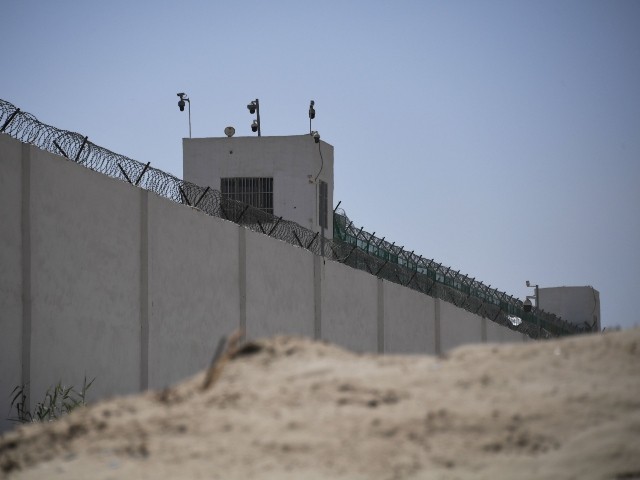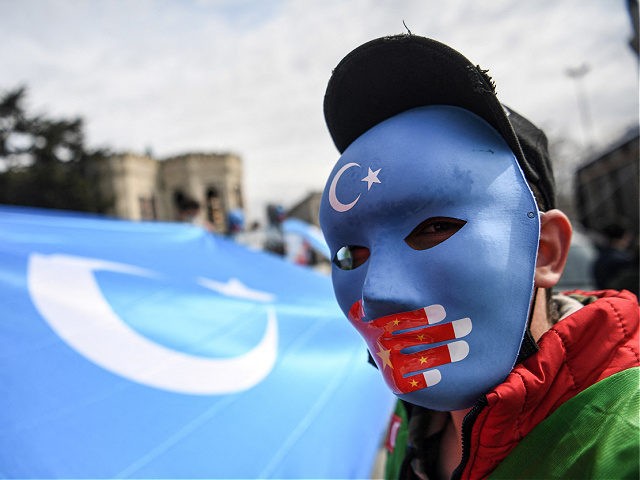According to a Chinese police officer quoted by Radio Free Asia (RFA) on Wednesday, the Chinese government has issued directives across the Xinjiang region forbidding its captive population, the Uyghur Muslims, from discussing the brainwashing camps in their province.
The Uyghurs have also been instructed not to answer telephone calls from overseas numbers. These gag orders reportedly are intended to sanitize Xinjiang before the arrival later this month of U.N. High Commissioner for Human Rights Michelle Bachelet.
After years of comically obvious efforts to keep Bachelet – formerly the socialist president of Chile – and other U.N. observers at bay while they cleaned up their dirty work, the Chinese finally agreed in March to let the commissioner visit before the end of May.
The price for this long-delayed visit apparently included the U.N. suppressing a damning report on human rights in Xinjiang. This infuriated many human rights activists, who suspected Bachelet’s visit would end up as the same kind of stage-managed whitewash the World Health Organization (W.H.O.) encountered when researching the origins of the Wuhan coronavirus.
“We have been concerned by the relative silence of your Office in the face of these grave violations,” a coalition of groups including Amnesty International and Human Rights Watch wrote to Bachelet in March, demanding the timely release of the U.N. report on Xinjiang.
RFA’s report on Wednesday strengthened those concerns, as a police officer in the Xinjiang region – a self-described Chinese Communist Party member who had to remain anonymous for his safety – said law enforcement agencies are receiving weekly “political study sessions” with instructions for how to manage the U.N. visit:
Officials issued a notice prohibiting Uyghurs from speaking about “re-education” or internment camps, but added that if the topic arose, they should only mention positive aspects of re-education, namely that it is a pathway to living a good and normal life, the Kashgar officer said.
Uyghurs have been told not to speak spontaneously when the U.N. team arrives and asks questions, he said.
“We were told not to speak about re-education and the current situation, and that we should speak positively about life here,” the police officer said.
RFA said it made contact with this Xinjiang police officer in the course of confirming reports that Uyghurs were paid to perform festive dances to celebrate the end of Ramadan, fueling Beijing’s propaganda that the province is not suffering under religious repression.
RFA also documented several examples of Chinese officials warning Uyghurs not to divulge “state secrets,” take phone calls from unknown numbers or speak to U.N. investigators without government approval. The Chinese government actually created instructional videos showing the Uyghurs how to program their phones to automatically reject phone calls from foreign numbers.
“Before the U.N. team goes, they are worried that the people will tell the real information about the situation on the ground. That’s why they are emphasizing these restrictions,” concentration camp survivor Zumrat Dawut told RFA.

This photo taken on May 31, 2019, shows the outer wall of a complex which includes what is believed to be a concentration camp where mostly Uyghur Muslim ethnic minorities are detained, on the outskirts of Hotan, in China’s northwestern Xinjiang region. (GREG BAKER/AFP via Getty Images)
“The Chinese government has given no indication that the UN high commissioner will be allowed to see anything they don’t want her to see. She should not fail the victims of crimes against humanity and other grave abuses by enabling the Chinese authorities to manipulate her visit,” Human Rights Watch (HRW) China director Sophie Richardson pointed out last month.
“Without an ambitious and robust agenda to advance human rights in China, Bachelet’s visit risks empowering the abusers, not their victims,” Richardson said.

COMMENTS
Please let us know if you're having issues with commenting.